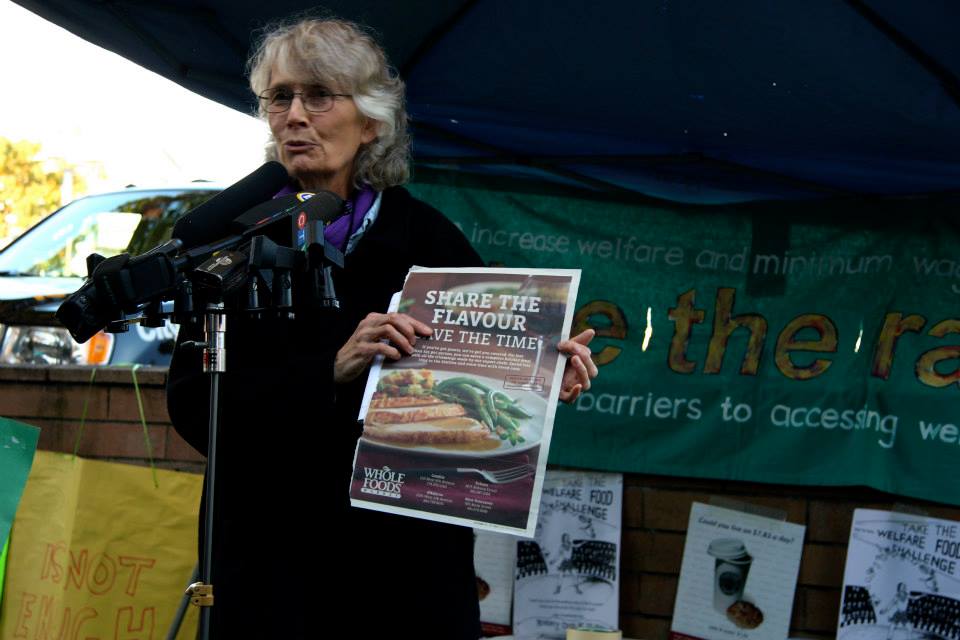
Community Spotlight – Jean Swanson, a life against poverty: By Sarah Sheridan

For our issue on the BC Liberal legacy, Volcano editors turned to our Community Spotlight on a legacy of our own to highlight her over 40 years of anti-poverty work. Jean Swanson is an editor with The Volcano alongside her work with the Carnegie Community Action Project. She previously worked with the Downtown Eastside Residents’ Association (DERA) and is the author of a book titled Poorbashing: The Politics of Exclusion.
You’ve been active in anti-poverty work for a long time. What has been the biggest realization that you have had with regards to poverty in this province? Has your understanding or approach to government changed over time and through experience?
My approach to government has definitely changed. Back in 1979, I actually ran as an NDP MLA candidate because I thought being involved in electoral politics was a way of implementing the things you’ve been fighting for in the community. I ran with COPE for city council too, along with my co-workers Bruce Eriksen and Libby Davies, who were elected. In those days it seemed possible to get city council to do some good things for the Downtown Eastside if we worked hard at it: fund the Carnegie Centre, pass a Standards of Maintenance bylaw, put sprinklers in the hotels.
In the early 90s, after the NDP cut welfare and brought in a whole poorbashing framework to justify it, I couldn’t bring myself to vote at all, let alone run for office.
Since those days when you first began your work to fight for more and better housing and higher welfare rates, what’s been the biggest challenge in this work.
One thing is that poverty isn’t a priority of most people who aren’t poor and a lot of people who are poor are too busy surviving to do political things.
Another huge issue is discrimination against people who are poor. In the early 90s poorbashing was off the top horrendous and in-your-face. Now it’s subtler but still overwhelming. For example, there’s so much underlying discrimination against people who are poor that for the last few years the NDP has refused to actually say that they would raise welfare rates, even though they clearly know they are too low. They have finally said in their latest platform that they would raise welfare by $100 – not nearly enough.
Probably the biggest problem is the power of the corporations, funding think tanks to spew out propaganda, getting it out to media which they own, spreading it into the heads of academics and ordinary people, funding the political parties who do what they want.
I used to be the editor of a paper called the Long Haul. Some younger folks told me that wasn’t a good name cause it would make people depressed to know they couldn’t have immediate victories. But I think it’s good to understand what we’re up against clearly. That way we can be realistic about what we’re tackling and the likelihood of victory. A long term plan should influence our strategies and tactics too.
Have there been successes or acts of resistance along the way, big or small, that you find helpful to reflect upon?
Organizing the Vancouver peace marches in the 1980s was fun. It was one of those things that seemed to have a life of its own. At first it would be just a handful of mostly elderly women Communists gathering at one end of the Burrard Bridge and marching across on the sidewalk, and then, because they kept the idea alive, we had a couple of years with 50,000-80,000 people. And we got those signs put up at Vancouver borders that said welcome to Vancouver, a nuclear free zone. Then they were replaced with signs about the Olympics.
I remember the fun things like the Poverty Olympics. We had them three years in a row leading up to the Vancouver Olympics–our own mascots, Creepy the Cockroach, Itchy the Bedbug and Chewy the Rat. Our own games–my favorite, the broadjump over the bedbug infested mattress. It was a great event for uniting the community and everyone the media interviewed had the same message: if the money spent on the Olympics had been spent on ending poverty and homelessness, it could have been done.
Thank you for all of your hard work over the years Jean!
